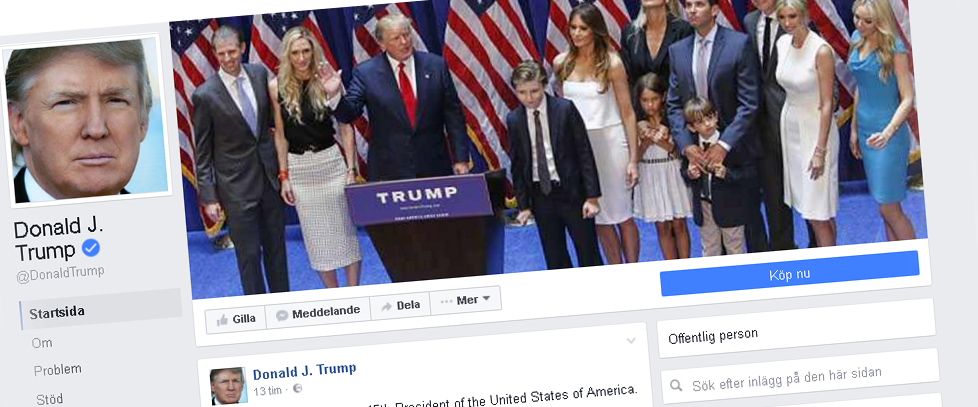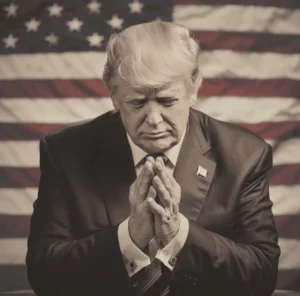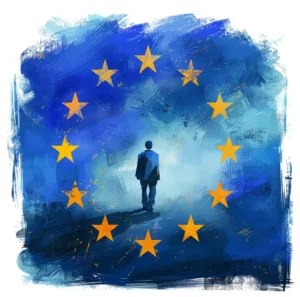The dirty American election has passed and now different types of post-election reports are starting to be published. It is the first election where social media gained real impact and where the political parties went "all in". If we ignore the political message, they were significantly more responsive, smart and aggressive about how they used social media. Online campaigns have changed the way different interests can manipulate the political debate. Whoever spends the most money in the smartest way increases his probability of winning in democratic elections.
A few days before the election, according to many traditional observers, Hillary had a greater probability of winning, which means that the Trump gang dared to take greater risks in the final days. Most likely it was one smash-and-grab effort on Facebook against targeted geographic battleground states like Wisconsin, Michigan, Pennsylvania and negative campaigns against certain demographic groups last week that changed the entire election.
According to the Washington Post also used Hillary Clinton's campaign algorithm marketing and their algorithm was named Ada which was described as hugely complex and running 400,000 simulations per day. Ada showed campaign manager Robby Mook how to allocate their resources by state. You can therefore say that this algorithm waged war against Facebook's demographic algorithm, which also worked in real time - and we all know the end result...
Psychometrics – campaigns targeted at different personality types on Facebook
According to an article in Motherhood has also worked for Cambridge Analytica Leave.EU and the Brexit campaign. Cambridge Analytica is a British big data company that specializes in "election management". Other companies with similar influence models, i.e. influencing politicians with social media, are CTF partners who have run campaigns for Boris Johnson, Saudi Arabia and hard Brexit and the lobby organization Leave Means Leave which is supported by Richard Tice.
Cambridge Analytica is an offshoot of the SCL group and specializes in election management strategies and microtargeting for political campaigns, which has been developed in places like Pakistan and Afghanistan over 25 years. In military circles, the methods are called psyops (In Sweden, we have a union that works with psychological operations) Source Guardian. One article in the Guardian writes that the software from Canadian Aggregate IQ could be used by SCL Elections.
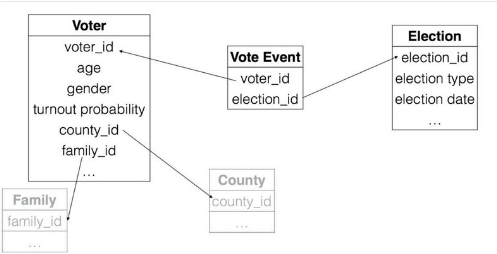
The overall purpose of this database model would be to collect and analyze data to better understand voter behavior, especially undecided voters. This may include identifying trends and patterns in voting behavior, understanding how demographic factors affect turnout, and analyzing how different types of elections may have different impacts on different voter groups.
How did you find the undecided voters?
A combination of data analysis, opinion polls and psychographic profiling is often used to identify undecided voters. Here are some methods that can be used:
- Demographic and behavioral data analysis
- By analyzing voter data, one can identify patterns that are common among undecided voters. This may include factors such as age, gender, education level, geographic location, Internet search behaviors and website visits, and previous voting participation.
- Voters who do not consistently vote for a particular party or who vary in their participation in different elections can be classified as undecided.
- Opinion polls and focus groups
- Direct questions about political preferences and opinions in opinion polls can help identify undecided voters.
- Focus groups can be used to gain deeper insights into what drives voters, especially those who are undecided or undecided.
- Psychographic profiling
- Psychographic profiling involves analyzing individuals' personality traits, values, opinions, interests and lifestyles.
- Models such as OCEAN (Openness, Conscientiousness, Extraversion, Agreeableness, Neuroticism) can be used to understand psychological tendencies that can influence political decisions.
- This information may come from surveys, social media, online behavior and other sources.
- Analysis of social media and online behavior
- By analyzing how individuals interact on social media and the type of content they engage with, insights into their political views and potential insecurities can be gained.
- Algorithms can be used to identify patterns of behavior that correlate with political uncertainty.
- Data from previous elections
- Historical election data, such as voter turnout and individual-level election results (if available), can provide indications of voter uncertainty.
- Combined data analysis
- Often a combination of these methods is used to get a more comprehensive picture of voter behavior and opinions.
According to an article in the Guardian paid Trump's team $6 million to influence undecided voters but according to a talk by Cambridge Analytica held in Stockholm in May, 8-figure sums were talked about so it could be much higher. The strategy is to retrieve data from Facebook and use customized Facebook ads against voters.
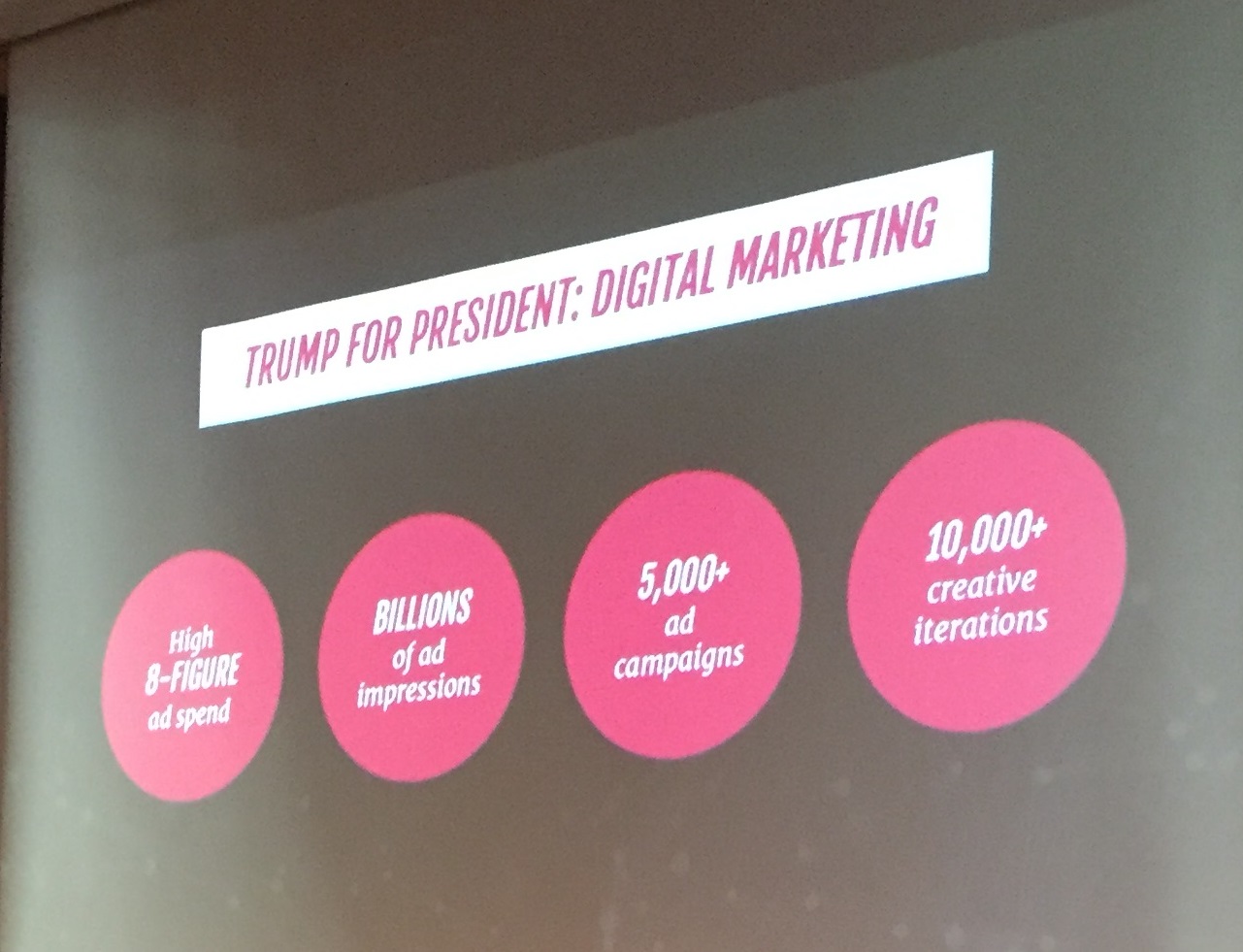
Picture: from Cambridge Analytica May 2017 talk showing the scale of the campaign.
Cambridge Analytica uses psychometrics and personality types and is run by CEO Alexander James Ashburner Nix, who according to his LinkedIn page has about 20 people based in Washington. In May 2017 I listened to a talk by David Wilkinson lead data scientist at Cambridge Analytica who lectured on data-driven digital in 2016 US Presidential.
Video how they used psychographics for Senator Cruz's campaign that used behavioral science, psychographics (voter personality) based on the OCEAN model.
Trump succeeded in influencing swing voters and women
In the end, the US election was about influencing swing voters and getting over 51% in the various states to get the electoral votes. Trump managed to win 53% of the votes of white women and especially in the 3 swing states that played the biggest role ie Wisconsin, Pennsylvania and Michigan. Trump also managed to win the votes of college-educated white women. 59% of all white women had a poor image of Clinton and 65% stated that she was dishonest.
On Facebook you can target campaigns against different genders and it is likely that they had a strategy for women and especially those who lived in the Swing states. In the campaign, the Trump gang was very successful in influencing traditional Democrats to vote for him by acting dynamically and targeting negative campaigns.
Trump's official campaign that was run from the US
Gary Coby (who officially ran Trump's campaign) later tweeted that it was false information that Cambridge Analytica and Nix were involved and that he used "psychograps" and it is sensitive how the campaign was run.
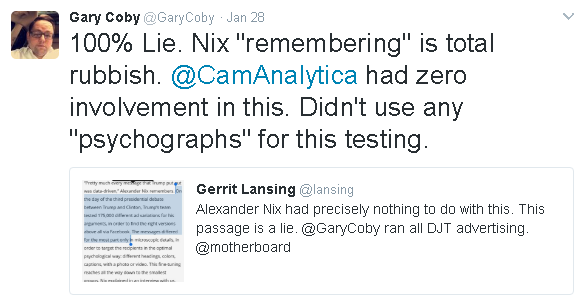
And Trump's unofficial campaign that was run from the UK
It is reasonable to assume that the campaigns ran several Facebook ad campaigns in parallel, one official and several unofficial ones, including the one from Cambridge Analytica. In any case, the company seems to have had a very large budget to not be involved. In Cambridge Analytica's talk, they showed a picture of an untidy small office in the US and the speaker made it sound vaguely like they were in contact with each other during the campaign. They also demonstrated a sophisticated reporting system with American locations at a detailed level and which "winning messages" were to be conveyed.
According to the Cambridge Analytica website, they divide personalities according to the OCEAN model (similar models are called the five-factor model), which has become a standard model in psychometrics.
- Openness (if they are open to new experiences)
- Conscientiousness (conscientiousness and if they prefer plans and accuracy)
- Extraversion (if they are sociable and spend time with others and have warmth in their relationship with others)
- Neuroticism (if they are anxious and prone to anxiety)
Based on these dimensions you can say relatively precisely what a group of people needs, what fears they have, etc. Traditional political campaigns have often appealed to the group of open-minded people - but with this model you can reach completely new groups and also give them completely different messages. A person who is neurotic and anxious, you can tailor a message to - which is rarely done in traditional politics - directly and it is possible to increase the effectiveness of the campaign by more than 20%. According to the lecture that Cambridge Analytica had in Stockholm, they used several different targeting methods in addition to demographic targeting, they ran hyper-local geographic targeting.
Psychologist Michal Kosinski has developed a similar method to analyze people based on their behavior on Facebook.
The results are described in a research study that people's personalities can be predicted automatically and without the involvement of human social-cognitive skills.
The different digital channels were used in different ways
In addition to Facebook, different digital channels were used in different ways.
- Email – traditionally used to get donations and here the Democrats have excelled (both the Obama campaign and the Hillary campaign were run by Toby Fallsgraff)
- Facebook was arguably the most important channel where negative articles were used
- Twitter – was used to support various political arguments as well as negative concepts
- Snapchat was used by both Republicans and Democrats, and Republicans used Snapchat primarily effectively supporter building against the core groups and to mobilize the campaign.
- Donald Trump for President app for supporter building. A metric used was volunteer and app user engagementt.
- Websites - with fake news which in turn was shared on social media by the target constituencies
- Fundraiser campaigns run by the RNC Performance, Optimization & Experiments Team (POET). In total, they did 300 tests from July to November 2016 where they raised over $30 million. Some of these are invented RNC Testing Booklet.
Google Trends
You could see early on that Trump had significantly more impact on the Internet when you compared Hillary against Donald in tools like Google Trends. I think the media underestimated his populist message which went viral.
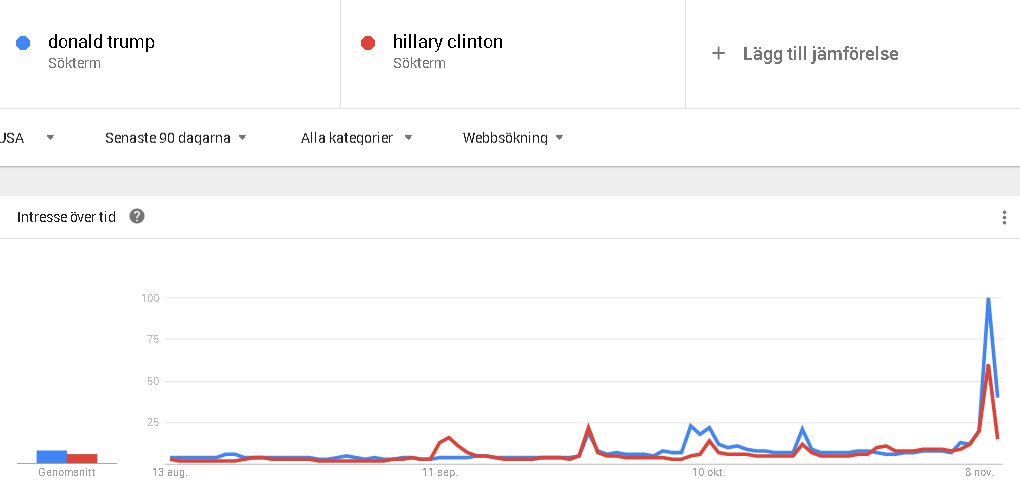
Facebook was the most important digital channel
Facebook was the most important channel according to Trump's digital directors Brad Parscale and Gary Coby and for many Americans it is the only source of news. The channel also taught them how to change the message along the way through multi variable testing. Parscale and Coby tested between 40,000 to 60,000 different Facebook ad variations for online fundraising every day. James Barnes who was client solution manager in Facebook in Washington DC was MVP (most valuable player).

Here are some examples of what Gary Coby has tweeted about:
- Negative if HRC (Hillary Rodham Clinton) was sent to New York
- Negative about HRC to younger men. NRSC = National Republican Senatorial Committee where TimCameron is Chief Digital Strategist
- Multivariable tests with Facebook to screw up messages and $
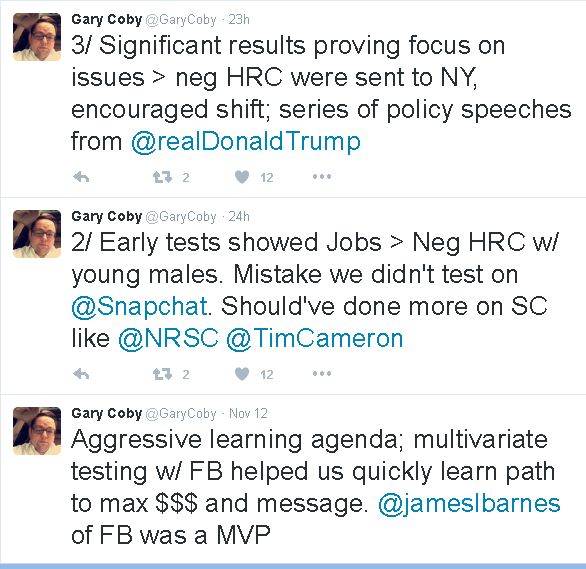
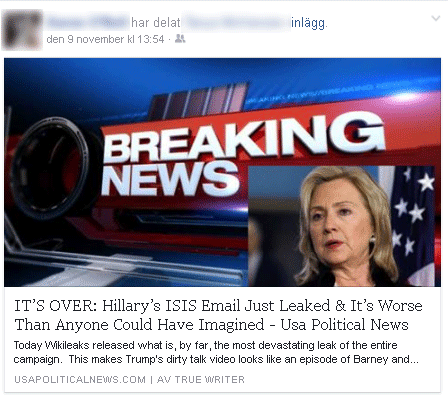
Negative campaigns and fake news on Facebook in the days before the election
In connection with FBI director James Comney opening a new investigation against Hillary 11 days before the election regarding her mail server, which several, including Hillary Clinton herself, turned the election. The news received a lot of publicity and was spread in social media as "Crooked Hillary". Fake news increased about Clinton and covered everything from pedophilia linked to the campaign, Hillary's bisexual relationships, anti-Semitism and other stories that were not accurate according to Robby Mook who was Clinton's campaign manager.
Buzzfeed has written about de the fake news that got more spread than from real newspapers and they also got more viral spread and more engagement. The most spread fake news was Pope Francis endorsing Trump followed by Hillary selling weapons to ISIS.

Picture: Stockholm May 2017 Lecture by David Wilkinson lead dataa scientist at Cambridge Analytica showing that anti-Hillary spots gave 11.3% increase to Trump's advantage and 8.3% higher intention to vote for Trump.
The Wall Street Journal has reported that after the election, Facebook has said it is weeding out fake news after receiving criticism after the election of how the Facebook Audience Network has been used. For the conspiratorially inclined, one of the major Facebook investors, Peter Thiel, has been an open supporter of Trump.
We don't know if they used remarketing on Facebook, but if they ran Facebook's remarketing pixel, it is theoretically possible to reach the base that read the news but more negative news. It doesn't end there, but it is possible to find twins on Facebook and direct the message to the type of people who nibble and absorb negative news.
There were tons of obscure negative articles on Facebook about Hillary Clinton about corruption and various articles ranging from her allegedly killing Vince Foster to having a lesbian affair with her press secretary Huma Abedin. The pictures that I posted are only a fraction of what I got to see myself.
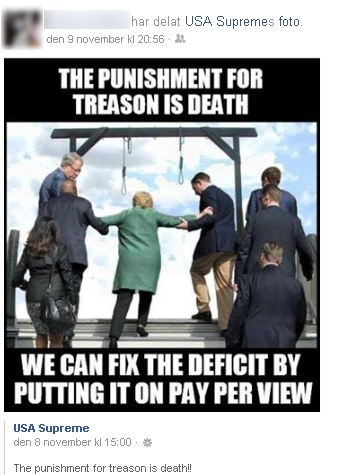
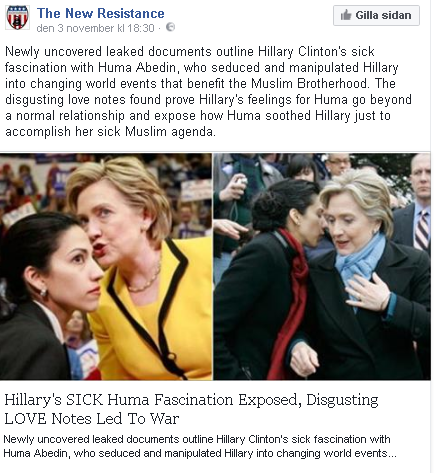
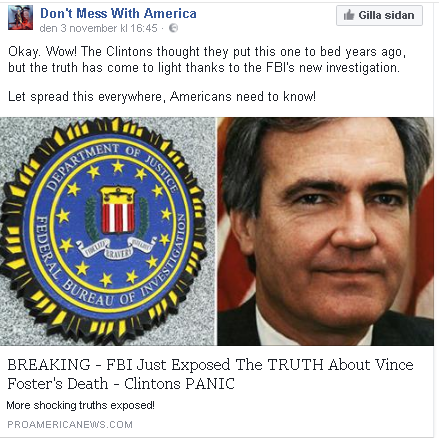
But founder Marc Zuckerberg of Facebook rejects the criticism.
– The idea that fake news on Facebook would have somehow influenced the election is a pretty crazy idea. If you believe that, you have not understood the message that Trump's supporters sent in this election Zuckerberg commented to the BBC. For the conspiratorially inclined, one of Facebook's investors, Peter Thiel, has invested in the Trump campaign.
Legal aftermath
In December 2022, Facebook owner Meta agreed to pay $725 million over a data breach linked to Cambride Analytica. They did not admit that they had done anything wrong but at the same time said “it had revamped its approach to privacy over the past three years. In a statement, the company said settling was "in the best interest of our community and shareholders".
The Twitter campaign
Twitter could change the campaign in a very short time and Donald Trump's Twitter account was also hugely important in the campaign and gave the impression that there was a large voter base who had similar views and who retweeted the content and liked what was written. There are of course quite a lot of people who share what Trump says, but new for this election were software bots masquerading as humans and influencing the political course in social media like never before and are a real threat to democracy. Within the blackhat world there are bots for most social media (Twitter, Linkedin and Facebook) and it is probably mainly on Twitter that various Twitterbots were used. It is not unlikely that people with certain political views tried to influence with their own bots.
One study released in 2022 concluded that Twitter did not significantly influence voters.
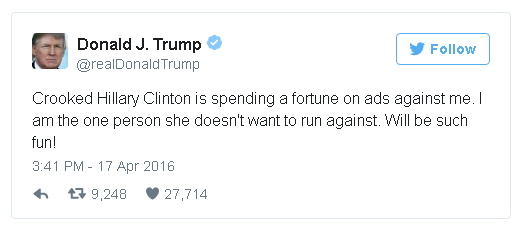
The campaign used paid emojis that were tied to a specific hashtag. When someone uses a hashtag, an emoji is automatically added to the end, for example #CrookedHillary who used a hand holding a money bag.

A surprisingly high percentage of the political discussion taking place on Twitter was created by pro-Donald Trump and pro-Hillary Clinton bots, or social bots, with the express purpose of skewing online discussion about the election. The researchers analyzed 20 million election-related tweets created between September 16 and October 21. They found that robots, rather than humans, produced 3.8 million tweets, which was equivalent to 19%. Social bots also accounted for 400,000 of the 2.8 million individual users, or nearly 15 percent of the population, according to the study.
Twitterbots have been analyzed and the researchers at the University of Southern California have concluded that 400,000 of these Twitter accounts are likely to be pro-Donald Trump bots. These have generated a large number of Twitter messages for the Trump campaign. These bots have become so sophisticated that they can tweet, retweet, share content, comment on posts, “like” candidates, cultivate their social influence by following legitimate human accounts, and even engage in human-like conversations.
Even the Clinton campaign had bots but Trump's bots had more and produced more tweets giving the impression that there is a large popular support for a certain candidate when in reality it is artificially generated. The accounts may also write that a certain person won one of the debates. Source First: Alessandro Bessi and Emilio Ferrara edition November 7.
A similar study released last month by researchers from Oxford University, the University of Washington and Corvinus University of Budapest reached similar conclusions that pro-Trump beat out produced pro-Clinton accounts by seven-to-one.
Examples of negative campaign sites against Hillary Clinton
Fake news
There was a lot of negative information about Hillary Clinton and if you do a Google search on the term "Crooked Hillary" you will get 12,700,000 search results.
The Huffington Post has in one article wrote about how the left and their frontman Bernie Sanders had a troll campaign against them and an almost tsunami of fake news. There were articles that Clinton had murdered her political opponents and that she ran a pedophile ring. When looking at the domains behind it, 40% was registered in Eastern Europe and many were in Macedonia and Albania.
Presumably it was people with a background in affiliate marketing because similar methods are used to make money on Google but the campaigns were well planned by the lawyer Trajche Arsov who collaborated with American partners. A name that appears around the fake news from Macedonia is the Russian Anna Bogacheva who is connected with the Macedonian fake news according to a article in Buzzfeed.
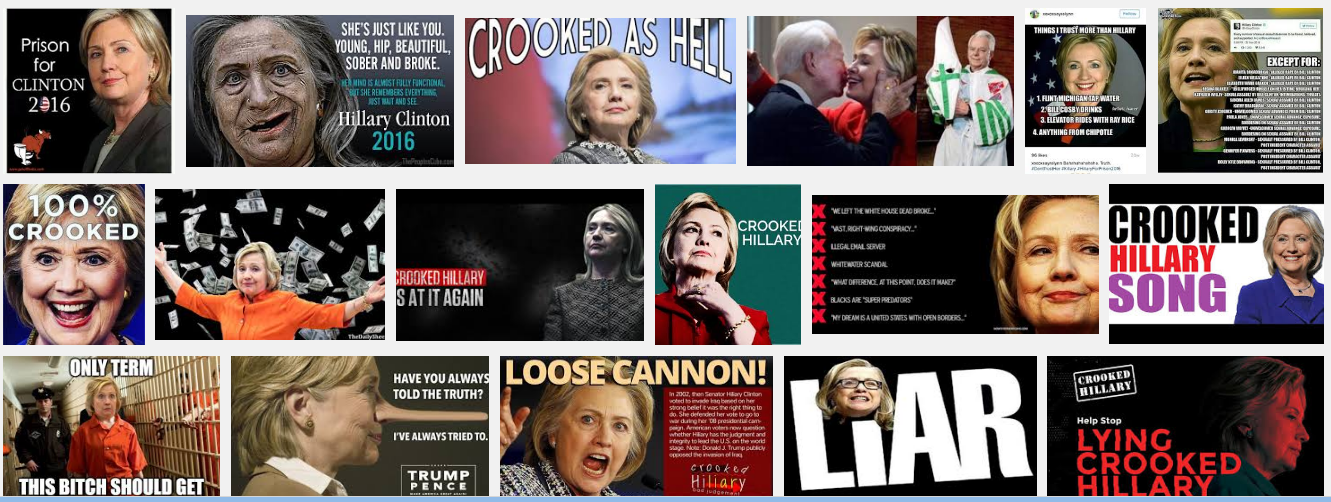
Buzzfeed News has identified more than 100 pro-Trump websites operating from the town of Veles in the former Yugoslav Republic of Macedonia. With headlines like "Hillary's killed her first American spy", "How liberals destroyed America", "This is why we need Trump in the White House". The Guardian newspaper has identified more than 150 domains registered to people with addresses in Veles. It can be difficult to know who is behind fake accounts and it is far from certain that they have official support - it does not have to be the parties but can be individuals who want to make money through ad networks and creating click baits because there is so much news about Donald Trump that visitors want to read.
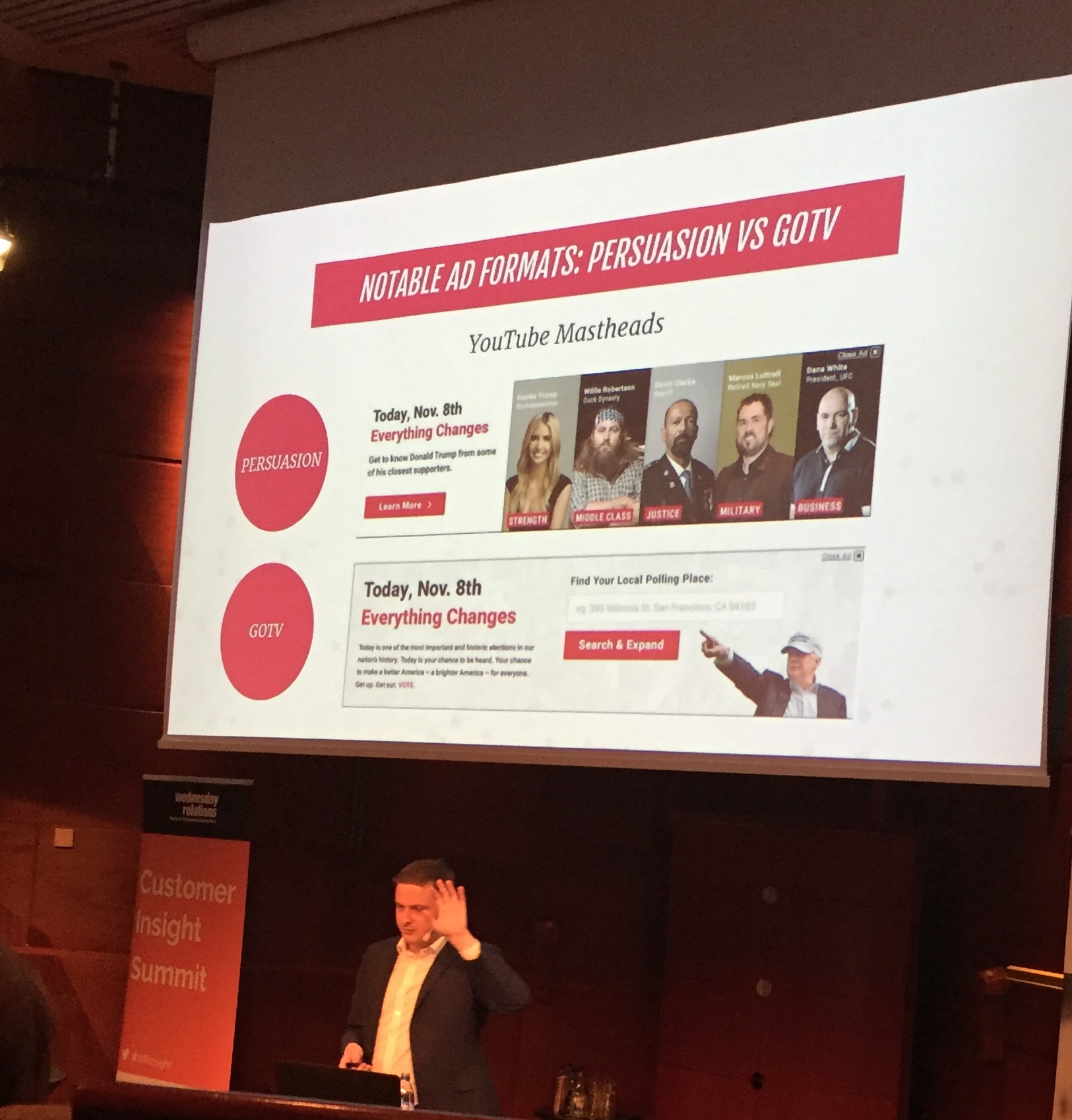
Picture: Lecture Cambridge Analytica showing different profiles that were used against different segments on Youtube.
Youtube
On YouTube, different role models were pushed out with different messages.
- Strength: Ivanka Trump
- Middle class: Willie Robertson hunter and television personality known for his Christian faith.
- Justice & Court: David Clarke, African-American with a cowboy hat who wants to deport immigrants
- Military: Marcus Luttrell US Navy hero
- Business: Dana White, President Ultimate Fighting Championship
Trump always had an advantage in publicity over Hillary, which you could see clearly on Google Trends.
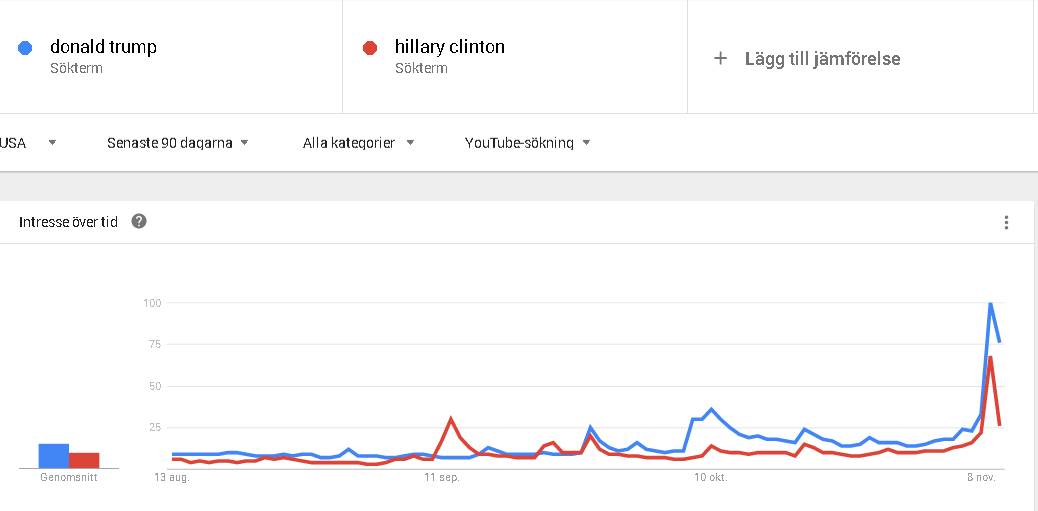
Who is behind Cambridge Analytica?
Before the elections, Cambridge Analytica was a fairly small data analysis company, but where Robert Mercer is one of the partners with a USD 10 million share. According to an article in The Guardian it was Robert Mercer, a hedge fund billionaire who helped finance the Trump campaign and he is also one of the owners of the far-right Breitbart News Network.
Mercer was also involved in the Leave.eu campaign and is friends with Eurosceptic and politician Nigel Farage. Mercer also saw to Trump's hiring Stephen Bannon and White House spokeswoman Kellyanne Conway. Mercer used its data analytics company to provide expert advice on the Brexit campaign and influence undecided voters through Facebook. Mercer also invests in organizations such as the Heartland Institute, which is a climate skeptic, and the Media Research Center, which aims to correct “liberal wrongdoing”
Trump's unofficial campaign and the contacts with Russia
The conspiracy theories - what were the motives behind Trump and Leave the EU?
The FBI is investigating whether Russia hacked into Democratic email servers and gave them to Wikileaks to get Trump elected. Much suggests that there were Russian interests in the Trump campaign and it is possible to donate money to 3rd party campaigns. Rumor has it that they ran the Trump campaign mostly from London and the Brexit campaign mostly from the US, which means that you can go around your own country's legislation.
The original campaign organization
From experience with NCPAC, they built up a political lobby organization "Black, Manafort & Stone" where they worked for a long time with negative campaigns already in the 80s under Ronald Reagan and they also represented Bush.
It was the largest and most powerful organization in Washington. We did things no one had done before.
Roger Stone
From experience with NCPAC, they built up a political lobby organization "Black, Manafort & Stone" where they worked for a long time with negative campaigns and foreign interests in Washington and were part of "The Torture Lobby” during the Cold War they represented dictators in Nigeria, Somalia, the Dominican Republic, Angola (Unita) Kenya and the Philippines under Marcos. Trump's former campaign adviser and lobbyist Roger Stone have acknowledged links to Russian hacker Guccifer 2.0 in a iinterview with ABC'S George Stephanopou. Guccifer was the same hacker who attacked the Democratic Party and published Hillary Clinton's email to Wikileaks. In the interview he says "Let's finish with Grucifer. My communication with her is now entirely publicc”.
Why do Republicans continue to support Trump in 2023?
Professor Anders Åslund, who is a Russia and Eastern Europe analyst, writes an explanation several years later in a Twitter post in January 2023.
The only plausible explanation is that key republicans, notably Trump, have been bought by the Kremlin. WE do know that Deripaska bought Manafort. Unfortunately, Robert Mueller never looked into Trump's finances or financial links to Russia. Deripaska is also interesting to us in Sweden because he is major shareholder in a number of Swedish companies such as the aluminum smelter in Sundsvall.
In Trump's original campaign circle, there were originally many people with business connections to Russia, besides Trump himself, you can find the campaign manager Paul Manafort and the campaign adviser Carter Page who was an international businessman who was recruited into the campaign and had offices near Trump Tower. Carter Page had been under FBI surveillance since 2013 when Russian officials sought to obtain information in the energy business. Carter Page spoke at RIA Novosti news agency in Moscow on December 12, 2016 according to the Washington Post. In March 2016, Carter Page was appointed foreign affairs adviser by Trump.
Michael Flynn a former lieutenant general was the head of the Defense Intelligence Agency was forced to quit as a security adviser after 24 days after it emerged he lied about speaking to Russia's ambassador. He was bought by Turkey's Erdogan around ISIS bombings.
Cambridge University has long been infiltrated by Russian intelligence - Cambridge Four and the most famous spy Kim Philby was a spy group during the Cold War so it is a natural place to choose if you want to have contact with the Russians. In February 2014 at Cambridge University, Flynn had dinner with Russian bankers. There is speculation online about a person Svetlana Lokhova and that she was involved as an agent. Flynn, he had email correspondence with 36-year-old Svetlana Lokhova, who is believed to be a Russian spy or to have connections to Russian spies. Source
Around the circle of Russians cooperating with Trump's circle is the Russian ambassador Sergey Kislyak, the businessman Igor Sechin with links to Putin: Felix Sater, Sergei Millian, svr agent Victor Podobny and Andrii V. Artemenko.
Trump's son-in-law and senior adviser Jared Kushner also met Putin's banker Sergey Gorkov, who is CEO of Vneshekonombank (Development Bank of Russia) which is Russia's largest state bank that finances political projects and aims to develop the Russian economy. There is speculation online that the FBI has more information about a person in the White House and it is wildly speculated that it would be Jared. If you're going to check the latest developments, keep an eye on the Washington Post's Devlin Barrett and Matt Zapotosky.
More about the personal connections
Putin's motives for supporting Trump are about geopolitics and oil. Putin controls the largest oil company in Russia and made a lot of money from working with Exxon Mobil - which Obama imposed sanctions on. The CEO of Exxon is now Foreign Minister Rex Tillerson et al. There are many strong Russian interests that wanted to see Trump but also want to see a weakening of the EU and NATO. EU anti-money laundering legislation is hardly something Russian oligarchs in London want in place.
Trump himself is said to be guilty Blackstone Bayrock Group 560 million dollars. Blackstone Bayrock Group is owned by Russian billionaires and has made billions from working with the Russian government.
Sources
- Lecture Stockholm Consumer Insight Summit May 9 by David Wilkinson Cambridge Analytica
- Emilio Ferrara, computer scientist and research director at the USC Information Sciences Institute (ISI), and USC Viterbi School of Engineering Research assistant professor.
- How to cure changed Trump's twitter account
- How Macedonia became a global hub for Trump's disinformation
- America's billionaire helped with Brexit
- Robert Mercer and Breitbar's war on the Media about Steve Bennon, Donald Trump and Nigel Farage
- Renaissance technologies Robert Mercer Donald Trump
- No one knows what the powerful mercers really want
- Meet the Mercers a quiet tycoon and his daughter become power brokers in Trump's Washington
- Will Donald Trump's Data-Analytics Company Allow Russia to Access Research on US Citizens?
- Dark Money is a threat to the integrity of UK elections
- Follow the Data – does a legal document link Brexit campaign to US Billionaire
- Ukrainian hackers obtained a unique photo of the commander of military unit 26165, who is wanted by the FBI for meddling in the US election
